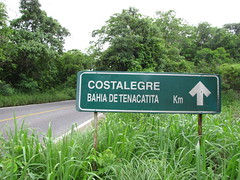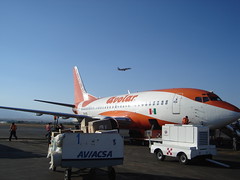SECOND UPDATE: Mexicana
suspended all flights Aug. 28, including domestic runs flown by its subsidiaries, Mexicana Click and Mexicana Link. The new owners, Tenedora K, failed to adequately slash costs, which it reportedly tried to do by firing the unionized flight attendants and pilots and then rehiring some of the staff at reduced salaries. The
federal government rejected the plan and refused to bail out Mexicana, which was privatized in 2005 and run up more than $1 billion
in debt.
What becomes of Mexicana remains uncertain. I always preferred Mexicana to its domestic competitor AeroMéxico, which, in my experience, hired less-friendly and less-resourceful staff who were always anxious to pass the buck and neglect customer service problems. Other airlines such as Interjet, Volaris and Vivaaerobus - all of which are less than five years old and have lower cost structures than Mexicana - will fill some of the void on domestic runs and AeroMéxico and
other competitors will no doubt add international flights. I'll definitely miss the direct runs back to Canada, though. It's possible some airlines such as Air Canada or Westjet will expand service, but the Canadian government's
visa requirement for Mexican travelers dampened enthusiasm for flights to Canada and AeroMéxico abandoned its Canadian runs
earlier this year due to a lack of demand.
UPDATE:
Mexicana has stopped selling tickets effective 6 p.m. Aug. 4 for travel on its mainline carrier, which flys international runs and many of the high-volume domestic routes such as Mexico City-Monterrey, Mexico City-Cancún and Mexico City-Tijuana. The company said
in a statement that it will continue selling tickets for domestic travel on its subsidiaries Mexicana Click and Mexicana Link as the operations of those airlines is unaffected by the financial and labour woes of Compañía Mexicana de Aviación.
Mexicana employees about to get a haircut
Compañia Mexicana de Aviación
has filed for bankruptcy protection in both Mexico and the United States, in a move the Wall Street Journey
said in a cheeky headline, "Wards off the repo man."
Mexicana de Aviación wants its pilots and flight attendants
to take pay cuts of roughly 40 percent in order to keep the company from going broke. The Mexicana employees rejected the proposed paycuts on Aug. 2 - along with an offer to buy the mainline part of the airline for just 1 peso.
Financial problems and subsequent labour unrest are just the latest patches of turbulence for Mexicana, an 87-year-old airline that company officials say has lost more than four billion pesos since being re-privatized in 2005.
The airline on Aug. 2 canceled service on three runs, reduced frequencies on others and
altered routing on many flights, which will now make a stop in Mexico City. Creditors had its planes held in Calgary, Montreal and Chicago. Mexicana says its operations will carry on as scheduled and its employees' unions say their members won't stop working.
Mexicana management says cuts need to made immediately for the carrier to survive. It's subsidiaries Mexicana Click, which operates many domestic runs, and Mexicana Link - a commuter-jet airline - are unaffected by the turbulence.
Pilots at Mexicana earn US $216,000 per year, while flight attendants earn US $52,000 per year. Under the management plan, pilots would earn US $127,000 per year. Flight attendants would earn $32,000 per year.
The company outlined plans to slash its labour force by 40 percent, too. The pilots' union said the company was distributing "inexact" statistics.
It also said, "It's a shame they value it for one peso."
The federal government has declined to become involved in Mexicana's problems.



